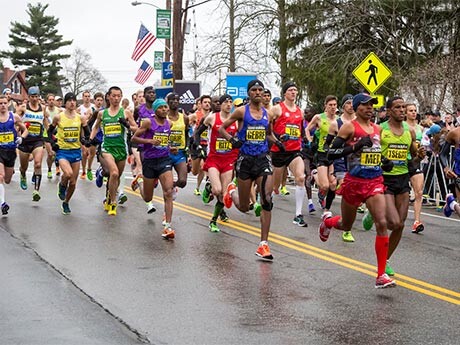Running News Daily
Running News Daily is edited by Bob Anderson. Send your news items to bob@mybestruns.com Advertising opportunities available. Train the Kenyan Way at KATA Kenya and Portugal owned and operated by Bob Anderson. Be sure to catch our movie A Long Run the movie KATA Running Camps and KATA Potato Farms - 31 now open in Kenya! https://kata.ke/
Index to Daily Posts · Sign Up For Updates · Run The World Feed
Let The Race Come To You
When we desire a certain outcome, it's common to try to over-control a race or force certain expectations. It's easy to disguise this kind of flawed thinking as being tough and committed to the goal. In actuality, we need to adopt a somewhat counter-intuitive mental approach.
As a local race director recently advised me, "you need to change up your approach and start letting the race come to you." This went against my typical mental mindset around racing. In fact, my college coach used to say, "make the race happen, don't let the race happen to you." Until now, that had always resonated.

While it doesn't guarantee control, better preparation and training do provide you with more tools to respond to whatever the trail throws at you. Letting the race come to you doesn't mean being a passive passenger in the experience. In fact, it means the opposite. Letting the race come to you means fully participating in and engaging with the actual adventure that you're on and welcoming every experience that it might bring.
Present Moment Focus
This re-frame allows competitors to be more present in their racing experience. In the past, I had made the mistake of crushing early miles, taking advantage of feeling fresh, and sometimes having too much of an urgency to stop for long at aid stations. With the new priority of letting the race come to me in my most recent competition, I didn't panic when I had a twinge in my back in the early miles or when gels weren't going down easily. Typically my thought process might have gone something like "Great. My body already hurts and I'm only at mile 18. I can't wait to see how bad it feels at mile 80."
Instead, I slowed to a hike on the uphill I was climbing to let the discomfort subside. I didn't worry about the potential of lost time. I wasn't concerned with what other athletes were doing. My only focus was addressing the current situation that I found myself in
Problem Solving
Trail running inherently comes with challenges. Even on great days when you achieve your desired outcome, it likely came with effective problem solving rather than simply a lack of problems faced. A byproduct of letting the race come to you with an eagerness to engage with it is that you're ready to assess and respond to any obstacle that you face, rather than resisting it or panicking.
This new mindset allowed me to calmly address what was in front of me without the panic or anxiety that comes with trying to predict how it's going to impact you further down the trail. Each challenge is simply a component of what the race is bringing with it and can also be welcomed and accepted.
Managing Information
When it comes down to it, racing is really about interpreting and managing the constant influx of information (i.e. how your body feels, the terrain, race position, weather) that you're being presented with, and deciding what is helpful feedback and what is an unproductive distraction. In the past, when I was trying to make the race happen, it was more difficult to accurately tell the difference.
For example, sometimes what I would treat as an irritating distraction was actually something that required my attention (i.e. heat and its impact on my fueling strategy). And, something that should have been dismissed as a distraction (i.e. what a competitor was doing) I interpreted as important feedback for my race strategy. When you let the race come to you, you're already in the mindset to receive and respond.
Not only do you know lots of information is coming your way, but you're ready for it. This information isn't a nuisance or a threat but in fact an inevitable and crucial part of the racing process.
This new perspective and mental approach of letting the race come to me transformed my racing experience and it can transform yours, too. Not only did it have a positive impact on the outcome of my race, but I found myself calmer, more engaged, and enjoying the process more than I have in a long time.
Processing Information During a Race: Feedback vs. Distraction
Accurately identifying the difference between actionable feedback and distractions is imperative to having a successful performance. Many athletes fall into the trap of taking distractions as feedback (i.e. responding to stomach issues by not taking in any more calories or fuel) or treating feedback as a distraction (i.e. pushing too hard or forcing a pace when your body isn't responding well to it).
Thinking about each of these scenarios ahead of time and planning your desired response highly increases the chance of efficient decision making when you face them on the trail.
by Trail Runner Magazine
Login to leave a comment




